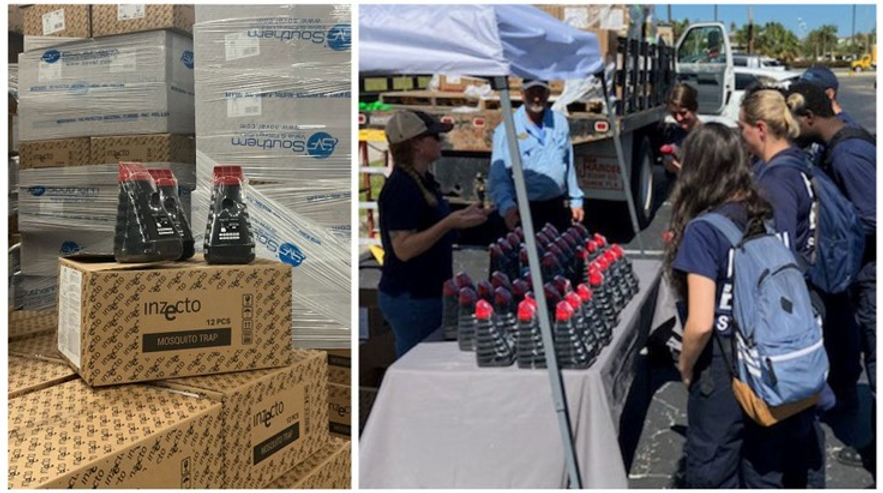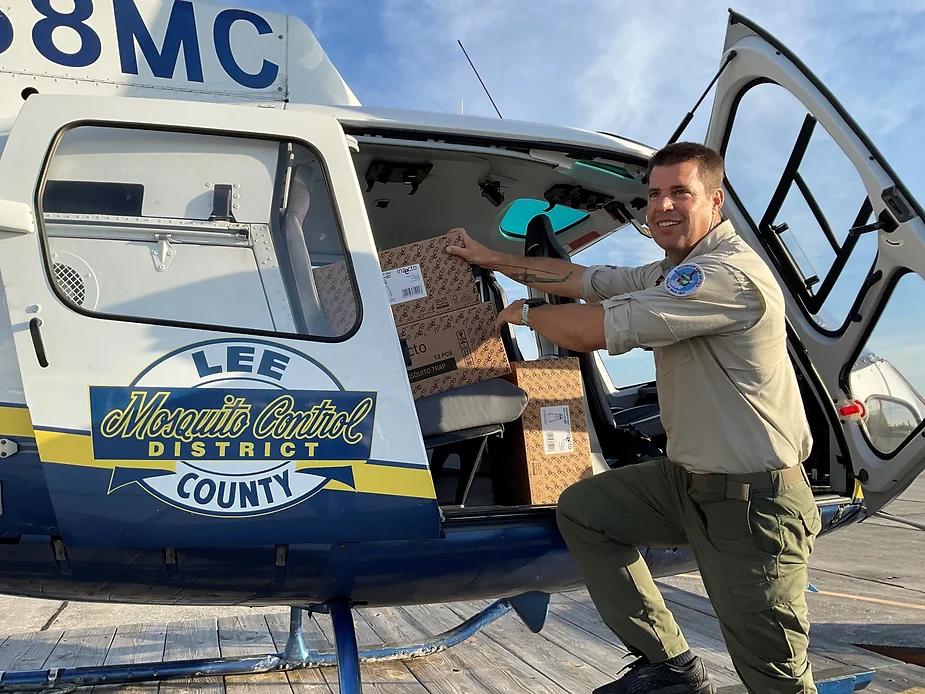INZECTO Mosqutio Trap Donation Helping to Reduce Post-Hurricane Ian Mosquito Populations
INZECTO has donated 100,000 traps to Florida counties to help reduce exorbitant mosquito populations in the wake of Hurricane Ian.

LEE COUNTY, Fla. — A truck stocked with 5,000 mosquito traps arrived at Northwest Exterminating’s Naples, Fla., location in October. The shipment was a donation from INZECTO, which enlisted the University of Florida through funding assistance from the Pentagon to develop eco-friendly control devices that could be distributed to deployed soldiers. This is one batch of 100,000 traps donated in four Florida counties impacted heavily by Hurricane Ian.
“It’s bringing the community together — it’s neighbors helping neighbors,” says Stephanie Hill, a regional director at Northwest. “We are all in this together in some form or fashion, and if we can help one house at a time, a street at a time, anything we can do…”
Northwest is a distribution site for the traps, and its technicians are working directly with customers to show them how to use the traps with pamphlets provided by INZECTO. “Anyone from the general public can stop in at our Naples location and pick up traps,” Hill adds.Hurricane events that spur floodwaters create natural breeding grounds for mosquitoes, says Dr. Phil Koehler, urban entomology professor at the University of Florida. He orchestrated the Inzecto trap research, development and design with students. “Floodwater mosquitoes lay their eggs above the water line and can wait for up to five years for a significant rain event to hatch, and then you get a large bloom of mosquitoes,” he explains. “These large mosquito populations we are seeing in the southern part of the state were predicted when the hurricane landed.”
In fact, Lee County caught a record 100,000 mosquitoes, Koehler says.
The state responds with aircraft that sprays insecticides. “But that has no residual effect,” Koehler says of the knock-down of flying mosquitoes only.
The INZECTO trap donations are bolstering state efforts. Koehler says, “We are hoping with the trap donation that the Air Force is bombarding mosquitoes in the air and we can help on the ground by putting out traps to further reduce the numbers.”
A Scalable Solution The INZECTO trap is the brainchild of Italian businessman and product innovator Enrico Paolo Levi, who reached out to Koehler with the concept. The U.S. military engaged the University of Florida for an easy-to-use mosquito control device that deployed personnel could use in the field. The device is a product of industry, academia and government collaboration — and now is in use to protect public health in the wake of Hurricane Ian.
“This is about public health, and in working with INZECTO, we felt we needed to do something to help because it is a Florida-based company, it was a device invented by us here at the University of Florida and licensed to INZECTO — everyone felt there was a need for the device to be in the hands of as many people as possible,” Koehler says.
The donation initiative was “an organic idea,” says Richard Pinto, INZECTO’s communication director who is helping get the word out about the traps so pest control companies and consumers can access the free devices. “The traps are specially designed for situations with a lot of standing water where people need to be protected. It just took off from there and we were able to enlist interest from four counties along with distribution partners.”
Lee, Orange, Collier and Charlotte counties each received trap shipments. Within those counties are distribution sites, including the University of Florida’s Institution of Agricultural Sciences and the Master Gardener’s program located at Orlando’s extension office. The Mosquito Control Districts in Lee and Collier Counties are also pick-up spots for pest management professionals (PMPs) and homeowners who want traps.

So far, the 100,000 donated traps hold a retail value of $2 million.
Pinto points out, “Not only did the trap come together through a global collaboration of research, science, entrepreneurship, innovation and investment, this distribution of the trap has gone in the same manner.”
The donation and distribution effort could be a model for future events that trigger mosquito activity. “We can set in motion a pre-designed plan so when another hurricane comes, we will have the pest control industry well positioned for rapid deployment of the devices,” Pinto says.
A Public Health Mission
The reason INZECTO traps are ideal for large-scale mosquito events like this is because they were invented to be easy, safe and even recyclable. The traps combine the insect growth regulator (IGR) pyriproxyfen and the adulticide permethrin into a polymer. A texturizing agent makes the surface appealing to mosquitoes and helps them adhere to the insecticide. The amount of pyriproxyfen in the traps meets World Health Organization standards for potable water.
Ideally, PMPs would provide traps to homeowners to explain how they work, Koehler says. “The presence of mosquitoes is a sign the trap is working and providing control,” he says, addressing a concern consumers might have when they see insects. The IGR prevents mosquitoes’ ability to develop into adults or reproduce.
Hill says educational materials provided by INZECTO are helping Northwest’s customers understand how the traps function. “And they are getting the word out in the community while we are at customers’ doors talking to them and asking if they would like a donated trap from INZECTO to help reduce mosquito populations,” she says.
The INZECTO effort also supports pest control companies’ public health and humanitarian efforts. “Our mission is to create healthier living and working environments,” Hill says. “So, partnering with INZECTO allows us to support the community in a way that speaks to what we do and who we are.”Originally Published in PCT Magazine
